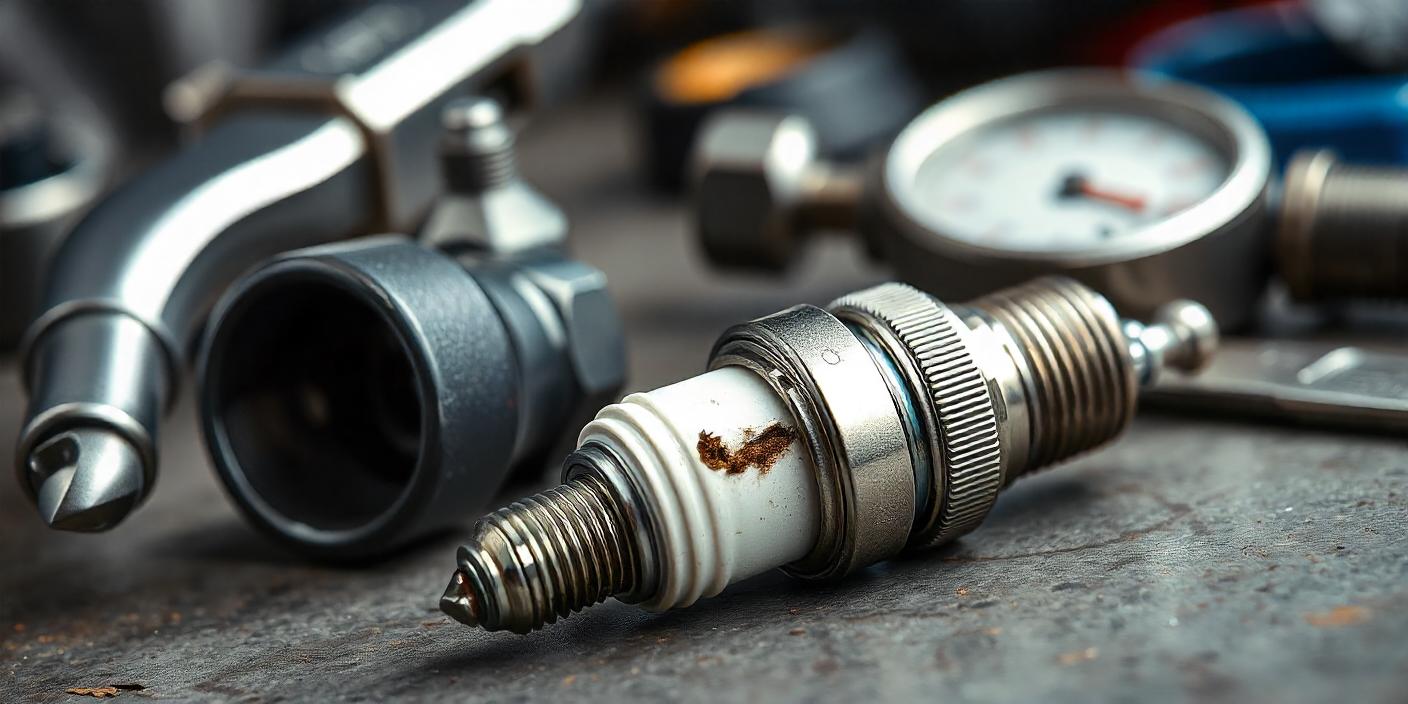A spark plug electrode can bend due to various reasons, including foreign objects in the combustion chamber, improper installation, engine overheating, or pre-ignition/detonation. Foreign debris or damaged engine components can strike the electrode, causing deformation. Over-tightening during installation or excessive engine heat can also weaken and bend the electrode.
Using low-quality spark plugs or mishandling them before installation may lead to similar issues. Symptoms of a bent electrode include engine misfires, rough idling, and reduced fuel efficiency. Preventing this involves proper spark plug installation, regular engine maintenance, and using high-quality components. Addressing the problem promptly helps avoid further engine damage.
In this article, we’ll dive into the possible causes of a bent spark plug electrode, the effects on engine performance, and preventive measures you can take.
Understanding the Role of a Spark Plug Electrode
The spark plug electrode is the critical part responsible for creating the spark needed for combustion. It must maintain its shape and gap for consistent engine operation. A bent electrode disrupts this process, often leading to inefficient combustion or misfires.
Common Causes of a Bent Spark Plug Electrode
- Physical Contact with the Piston
- One of the most common reasons for a bent electrode is physical contact with the piston or other internal components. This can happen due to improper installation, where the wrong spark plug length is used, causing the electrode to extend too far into the combustion chamber.
- Debris in the Combustion Chamber
- Foreign objects or debris in the combustion chamber can strike the electrode, bending it. This debris might come from carbon deposits, loose engine components, or external contaminants entering the engine.
- Pre-Ignition or Detonation
- Pre-ignition and detonation are abnormal combustion events that generate excessive pressure and heat in the chamber. These forces can physically deform the spark plug electrode.
- Over-Tightening During Installation
- Excessive torque during installation can damage the spark plug, including bending the electrode. Always use a torque wrench and follow the manufacturer’s specifications.
- Manufacturing Defects
- Though rare, a manufacturing defect in the spark plug can result in a weak or improperly aligned electrode that bends under normal operating conditions.
- Engine Modifications or Performance Tuning
- High-performance engines or modifications, such as increasing compression ratios or boosting horsepower, can create conditions that stress the spark plug electrode beyond its design limits.
Symptoms of a Bent Spark Plug Electrode
Recognizing the signs of a bent electrode can help you address the issue before it causes severe damage. Look out for these symptoms:
- Rough idling or misfires.
- Reduced fuel efficiency.
- Loss of engine power.
- Difficulty starting the engine.
How to Prevent Spark Plug Electrode Damage
- Choose the Right Spark Plug
- Always use spark plugs recommended by your vehicle’s manufacturer. Check for the correct length, heat range, and thread size.
- Proper Installation
- Avoid over-tightening spark plugs. Use a torque wrench to ensure they are installed according to the specified torque settings.
- Regular Engine Maintenance
- Perform regular maintenance to prevent carbon buildup and detect potential issues, such as debris in the combustion chamber.
- Inspect Before Installation
- Check new spark plugs for defects or damage before installing them. This simple step can prevent problems down the line.
- Avoid Harsh Engine Conditions
- If you have a modified or high-performance engine, ensure the spark plugs you use are designed to handle the increased stress.
How a Spark Plug Electrode Works
To understand why an electrode bends, it’s important to know its function in the combustion process. A spark plug consists of two electrodes: a central electrode and a ground electrode. When the spark plug fires, electricity arcs between the electrodes, igniting the air-fuel mixture in the combustion chamber.
The gap between these electrodes is critical—too wide or too narrow, and the engine won’t perform efficiently. A bent electrode alters this gap, disrupting the ignition process and leading to misfires or incomplete combustion.
Why the Spark Plug Gap Is Crucial
The gap between the electrodes determines how effectively the spark ignites the air-fuel mixture. A bent electrode can close the gap too much or widen it beyond the specified range. Here’s what happens in each case:
- Gap Too Narrow: The spark may be weak, leading to incomplete combustion or no ignition at all.
- Gap Too Wide: The ignition coil has to work harder to generate a spark, potentially causing coil damage or misfires.
Always check the spark plug gap with a feeler gauge during installation and adjust it as needed.
What Happens If You Ignore a Bent Electrode?
Neglecting a bent spark plug electrode can lead to escalating problems, such as:
- Engine Misfires: A bent electrode disrupts the spark, causing uneven combustion cycles.
- Increased Emissions: Poor combustion increases the emission of unburned fuel, harming the environment and potentially failing emissions tests.
- Catalytic Converter Damage: Misfires can lead to unburned fuel entering the catalytic converter, causing it to overheat and fail prematurely.
- Engine Damage: If the bent electrode is a symptom of piston contact or detonation, further damage to internal engine components can occur if left unresolved.
Advanced Diagnostics for Bent Spark Plug Electrodes
If the cause of the bent electrode isn’t immediately clear, these advanced diagnostic steps can help:
- Inspect the Combustion Chamber: Use a borescope to look inside the combustion chamber for debris, damage, or carbon deposits that might have caused the bending.
- Check Engine Timing: Improper timing can lead to detonation, which generates the excessive pressure that bends electrodes.
- Evaluate Compression Levels: A compression test can reveal issues like a damaged piston or valve that may have caused electrode contact.
- Analyze the Air-Fuel Mixture: A lean air-fuel mixture (too much air, not enough fuel) can lead to pre-ignition, which puts additional stress on spark plugs.
How Driving Habits Impact Spark Plug Health
Aggressive driving, such as rapid acceleration or high-speed driving, can increase engine stress and the likelihood of pre-ignition or detonation. Over time, this can damage spark plugs, including bending the electrode.
If you frequently drive under harsh conditions, consider using performance-grade spark plugs designed to withstand higher temperatures and pressures.
The Role of Heat in Electrode Bending
Heat plays a significant role in spark plug performance. Excessive heat from pre-ignition, detonation, or a lean air-fuel mixture can weaken the metal in the electrode, making it more prone to bending.
To manage heat effectively:
- Ensure proper cooling system function.
- Use the correct heat range for spark plugs. A plug with a heat range too “hot” can overheat, while one too “cold” may fail to self-clean.
Types of Spark Plug Electrode Damage and What They Mean
Different types of electrode damage can provide clues about the underlying issue:
- Bent Electrode: Often caused by physical impact or detonation.
- Eroded Electrode: Indicates a worn spark plug that needs replacement.
- Burnt Electrode: Sign of overheating due to pre-ignition, detonation, or incorrect heat range.
- Carbon Fouling: A blackened electrode points to an overly rich air-fuel mixture or oil contamination.
Inspecting the spark plug can offer valuable insight into the health of your engine.
What to Do If You Suspect a Bent Electrode
If you notice any symptoms of a bent spark plug electrode, remove and inspect the spark plugs immediately. Look for visible damage, such as a deformed electrode or carbon deposits. Replacing the spark plug is often the quickest solution, but you should also investigate the root cause to prevent future issues.
For more severe cases, such as piston-to-electrode contact or debris in the combustion chamber, consult a professional mechanic to diagnose and resolve the problem.
FAQs About Spark Plug Electrodes Bending
- What causes a spark plug electrode to bend?
A spark plug electrode can bend due to foreign objects in the combustion chamber, pre-ignition, engine overheating, improper installation, or physical damage during handling. - Can a bent spark plug electrode damage the engine?
Yes, a bent electrode can cause misfires, reduce engine performance, and, if left unaddressed, lead to further damage to components like the piston or cylinder head. - How do I know if my spark plug electrode is bent?
Signs include engine misfires, rough idling, difficulty starting, decreased fuel efficiency, and unusual engine noises. - Can I fix a bent spark plug electrode?
It’s not recommended to fix a bent electrode. It’s better to replace the spark plug to ensure proper engine function and prevent further damage. - What tools do I need to inspect spark plug electrodes?
Use a spark plug socket, a gap gauge to measure the electrode gap, and a visual inspection to check for bending or damage. - How can I prevent spark plug electrodes from bending?
Prevent bending by properly installing spark plugs, avoiding debris in the combustion chamber, using quality spark plugs, and maintaining the engine’s cooling system. - Does overheating affect spark plug electrodes?
Yes, overheating weakens the electrode, making it more prone to bending under combustion pressures. - Can pre-ignition bend spark plug electrodes?
Yes, pre-ignition or detonation creates excessive pressure and heat that can damage or bend the spark plug electrode. - Should I use high-quality spark plugs to avoid bending issues?
Absolutely. High-quality spark plugs designed for your vehicle’s specifications are less likely to bend or fail prematurely. - Is a bent spark plug electrode covered under warranty?
It depends on the manufacturer and the cause of the issue. Damage due to defects may be covered, but damage from improper installation or engine issues typically is not.
Final Thoughts
A bent spark plug electrode may seem like a small issue, but it can have significant consequences for your engine’s performance and lifespan. Understanding the causes and taking proactive measures can save you time, money, and headaches in the long run.
By choosing the right spark plugs, following proper installation practices, and maintaining your engine, you can avoid this problem and keep your vehicle running smoothly.

